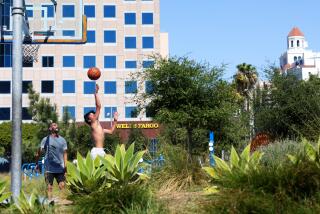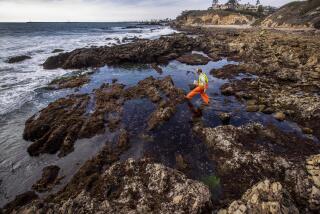After Spill, BP Soaked Up Oil and Good Press
- Share via
When the hull of the oil tanker American Trader ruptured Feb. 7 off the Orange County coast, British Petroleum faced war on two fronts: one against the spilled crude and the other for public opinion.
The oil cleanup battle will continue for weeks. But BP appears to have won the campaign to persuade the public that it reacted responsibly, seriously and quickly to clean up the mess.
The company’s aggressive effort to put its best foot forward in a crisis has won accolades from oil analysts and the public relations industry. They say BP’s quick action came in marked contrast to a plodding response by Exxon after one of its tankers went aground in Alaska last year.
“In each crisis, there is a window of opportunity or a window of challenge that lasts for a few hours or a day,” said John Paluszek, president of Ketchum Public Affairs in New York and immediate past president of the Public Relations Society of America.
“During that window, a company must show they are taking the crisis seriously and addressing it or neutralizing it. BP did a much better job than Exxon did.”
Within hours of the disaster, BP implemented a plan for dealing with the press. BP public relations officials, armed with handheld cellular telephones, were dispatched to points along the embattled coast wherever the press might congregate.
Whether it was a bird cleaning center, Huntington Beach City Hall or mingling among the yellow-clad cleanup workers on an oil-stained beach, BP officials say they tried to have a representative available.
Those forces were bolstered by private public relations specialists flown in from San Francisco on the night of the disaster.
When a television station wanted underwater footage of the holes in the bow of the American Trader, BP was ready to provide it. “That’s part of the story,” said BP crisis manager Chuck Webster.
When a producer for NBC’s Today Show corralled a pair of BP executives as they walked into Coast Guard headquarters in Long Beach the night of the disaster, they agreed to go live on a national television interview within an hour.
“BP, in recent years, has been much more PR conscious than Exxon,” said George Friesen, an energy analyst for Deutsche Bank Group in New York. “I think if they clean up the damage, this will fade from public memory very quickly.”
BP, which chartered the tanker owned by American Trading Transportation Co., had its share of face-saving breaks:
* The tanker that spilled nearly 400,000 gallons of BP oil belonged to an independent shipping company and did not bear the oil company’s name, unlike the Exxon Valdez.
* Though serious, the spill was small compared to the 11.1 million gallons that gushed from the Exxon tanker, soiling the rugged, pristine Alaska coast. Calm waters allowed skimmers to catch much of the oil at sea. The remainder landed on some of the Southland’s most fabled surfing beaches, but they proved far easier to clean than Alaska’s rocky shore.
* As embarrassing as it was for the tanker American Trader to apparently be speared by its own anchor, the captain of the tanker carrying BP oil was found to be sober and drug free.
* Though it is the third-largest oil company in the world, with net income of $2.2 billion on revenue of $48.6 billion in 1989, BP has a low profile in Southern California. It has no service stations here.
As the scope of the spill became evident, BP officials soon knew that their actions would become a focal point of public attention. The American Trader accident occurred in the second-largest media market in the nation, ensuring that even events in Eastern Europe would take a temporary back seat to oil-sodden sea gulls in Newport Beach.
“It was a firestorm. The whole world was watching,” said Peter Necarsulmer, recalling events on the night of the spill two miles off the coast. Necarsulmer and top officials in the San Francisco public relations firm he heads, The PBN Co., were hired by BP and flew in on the first night of the crisis.
At the same time, Webster and a group of BP executives mapped the crisis management strategy as they winged west from Cleveland. Since an oil slick can come ashore anywhere along a vast stretch of coastline, it was decided that the company would have to spread out its public relations troops.
“We decided on the plane that the organized way to address a situation like this was to put people wherever things were happening,” Webster said.
A public affairs office was hastily created at an existing BP office in Long Beach, right next to the company’s cleanup command center. Extra phones were brought in, which promptly rang off the hook.
Fred Garibaldi, vice president for BP Transportation, said company press liaisons established credibility by trying to give reporters as much information as they could without regard to how it would be viewed.
As Webster put it, “If we don’t have credibility, we might as well go home.”
Both Necarsulmer and company spokesman Tony Kozlowski said that one of the biggest problems during the hectic first day of the crisis was how quickly events occurred that required constant updating.
“We’d get a set of facts and they would change,” Necarsulmer said.
Besides dispatching BP representatives, the public affairs office scanned news clippings and television coverage to gauge the accuracy of reporting. In cases where a news report was apparently in error--such as when a newspaper reported that the oil seeped four feet, not four inches, into the beach--BP officials were quick to try to get hold of reporters to correct them.
Anything less than a completely open press policy will backfire, Webster said. “For a company to try to hide something--it’s going to come out.”
He added, “The best communications plan is not going to cover up a lousy operational response” to the spill.
He said the company’s efforts toward getting out information during the spill will pay off later.
“The people will be the judge of how well we’ve done the job” of cleaning up the oil, he said. “The public will decide whether we’re a worthwhile company to do business with.”
More to Read
Sign up for Essential California
The most important California stories and recommendations in your inbox every morning.
You may occasionally receive promotional content from the Los Angeles Times.












